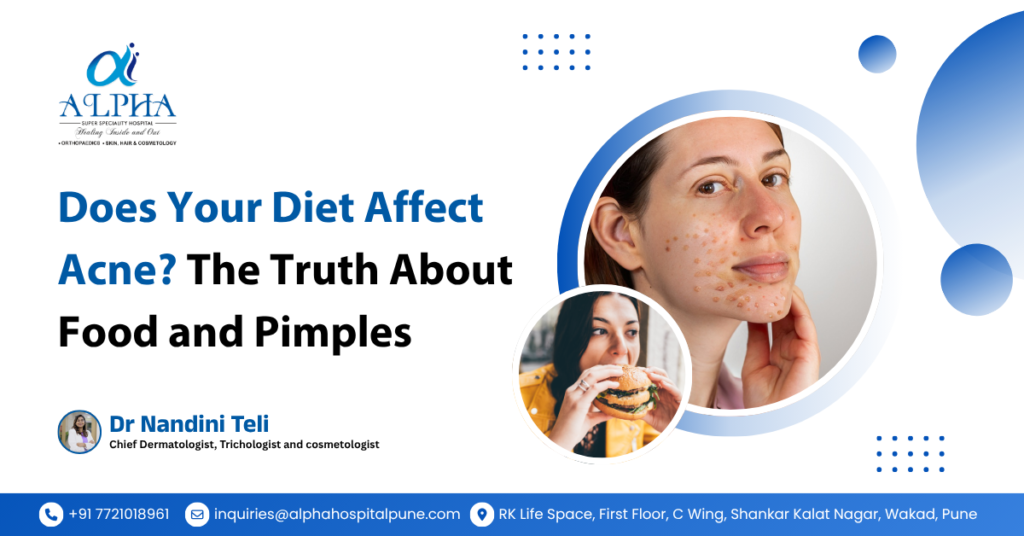Acne is one of the most common skin problems that affects teenagers and adults alike. While genetics, hormones, and stress play a major role, your diet can also have a surprising impact on your skin health. Many people notice that their acne worsens after eating certain foods — but is there real science behind it? Let’s uncover the truth.
What Causes Acne
Acne develops when the pores in your skin become clogged with oil, dead skin cells, and bacteria. Hormonal changes, pollution, and skincare products can trigger it — but your daily food choices can also influence how your skin behaves.
How Diet Affects Acne
- High Glycemic Foods (Sugar & Refined Carbs)
Foods like white bread, pasta, sugary drinks, and sweets raise your blood sugar quickly. This leads to increased insulin levels, which stimulate oil production and cause breakouts.
Tip: Replace sugary snacks with fruits, whole grains, and nuts. - Dairy Products
Research suggests that milk — especially skim milk — may worsen acne. Hormones present in milk can trigger sebum production and inflammation.
Tip: Try switching to plant-based alternatives like almond or oat milk. - Processed and Junk Food
Fried and oily foods contain trans fats and refined carbs that increase inflammation in the body, making acne worse.
Tip: Focus on clean, balanced meals with fresh vegetables and lean protein. - Chocolate
While dark chocolate in moderation may be fine, milk chocolate with sugar and dairy can aggravate acne for some individuals.
Tip: If you crave chocolate, go for dark chocolate (70% cocoa or more). - Omega-3 and Antioxidant-Rich Foods
Foods rich in omega-3 fatty acids — like fish, walnuts, and flaxseeds — can reduce inflammation and improve skin texture. Antioxidants from fruits and green vegetables help your skin fight free radicals and heal faster.
Skin-Friendly Foods for Acne-Free Skin
- Green leafy vegetables: Spinach, kale, and broccoli detoxify your body.
- Fruits rich in Vitamin C: Oranges, kiwis, and strawberries promote collagen and healing.
- Probiotic foods: Yogurt, kefir, and fermented foods maintain gut balance, which improves skin health.
- Zinc-rich foods: Pumpkin seeds and chickpeas help reduce inflammation.
Hydration Matters
Drinking enough water flushes out toxins and keeps your skin hydrated. Dehydrated skin can produce excess oil, which leads to clogged pores. Aim for at least 8 glasses of water daily.
Balance Is Key
Dr. Nandini Teli emphasizes that diet alone doesn’t cause acne — but it can make it better or worse depending on your choices. A balanced lifestyle with nutritious food, regular exercise, proper sleep, and stress management will help you achieve clearer, healthier skin.
Expert Advice from Dr. Nandini Teli
If you’re struggling with acne that doesn’t improve with dietary changes or over-the-counter treatments, consult a dermatologist. Dr. Nandini Teli provides personalized acne management plans that include medical treatments, skincare routines, and nutrition guidance to restore your skin’s health and confidence.
Key Takeaway
Your skin reflects what you eat. A diet rich in whole foods, antioxidants, and healthy fats — and low in sugar and dairy — can significantly improve acne and overall skin health.

